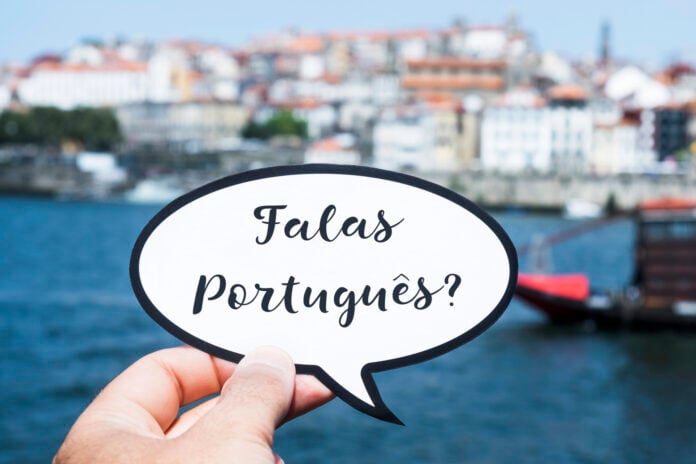Planning a trip to Portugal soon? While many Portuguese people speak English, especially in tourist areas, making an effort to speak the local language can make your trip to Portugal much more authentic. European Portuguese (as opposed to Brazilian Portuguese) has its own unique expressions that can instantly make you sound more like a local. Here are the top 10 European Portuguese phrases that will help you blend in during your Portuguese adventure.
1. “Que giro!”
Pronunciation – keh ZHEE-roo
Meaning – How cool! / That’s awesome!
This enthusiastic expression is used to show appreciation for something interesting or impressive. It’s much more local than saying “fixe” (see below) and is used across generations. Using this phrase when someone shows you something or tells you interesting news will make you sound like you’ve been hanging around Portuguese people for years.
2. “Não faz mal”
Pronunciation – nown faz MAL
Meaning – It’s not a problem / Don’t worry about it
This versatile expression is used constantly by Portuguese locals in countless situations: when someone bumps into you, when there’s a small mistake, or when you want to reassure someone. It’s more authentic than the more formal “não há problema” and immediately signals that you understand Portuguese social norms.
3. “Se faz favor”
Pronunciation – suh faz fah-VOR
Meaning – Please / If you please
This polite expression is used constantly in everyday Portuguese interactions when making requests. While tourists often use “por favor,” locals tend to say “se faz favor” in shops, restaurants, and when asking for directions. You’ll also notice the abbreviation “SFF” sometimes used on signs and in written communications throughout Portugal – this stands for “se faz favor” and is used on everything from payment requests to signs asking people to close doors or keep areas clean. Using this phrase instead of the more textbook “por favor” immediately signals that you understand how Portuguese people actually speak.
4. “Pois, pois”
Pronunciation – poysh poysh
Meaning – Yes, yes / Indeed / That’s right
This is quintessentially Portuguese. You’ll hear locals say “pois” or “pois, pois” in conversations all the time to show agreement. It’s the Portuguese equivalent of nodding along in conversation and shows you’re engaged.
5. “Então”
Pronunciation – en-TOW (nasal ‘en’ sound)
Meaning – So / Well / Then / So what?
This versatile word is sprinkled throughout Portuguese conversation. It can start a question, express surprise, or fill a pause. Listen for it and you’ll hear it everywhere! Using “então” at the beginning of sentences makes you sound instantly more local.
6. “É pá!”
Pronunciation – eh pah
Meaning – Hey! / Man! / Wow!
This informal exclamation is used to express surprise, emphasis, or to get someone’s attention. It’s very common among friends and in casual settings. Using this expression shows you’ve been paying attention to how locals speak.
7. “Fixe”
Pronunciation – feesh
Meaning – Cool / Nice
When someone shows you something interesting or tells you good news, responding with “fixe” is perfectly Portuguese. This slang term is especially popular among younger Portuguese people but is widely understood.
8. “Olha”
Pronunciation – OH-lyah
Meaning – Look / Listen
Portuguese people often start sentences with “olha” when they want to draw attention to what they’re about to say. It doesn’t literally mean “look” in this context, but rather “listen to this” or “pay attention.”
9. “Bica” (in Lisbon) or “Cimbalino” (in Porto)
Pronunciation – BEE-kah / sim-bah-LEE-noo
Meaning – Espresso coffee
Asking for a “bica” in Lisbon or a “cimbalino” in Porto instead of “um café” (a coffee) immediately identifies you as someone who knows local terminology. Coffee culture is huge in Portugal, and knowing these regional terms is impressive.
10. “Posso fazer festinhas ao seu cão?”
Pronunciation – POH-soo fah-ZEHR fesh-TEEN-yash ow say-oo CAOW
Meaning – Can I pet your dog?
Portugal is a dog-loving country, and you’ll see many locals walking their dogs in parks and along the promenades. This phrase will not only help you connect with the many dog owners but also shows you’ve gone beyond tourist phrases. Portuguese people will appreciate your interest in their pets and your effort to ask properly in their language. This phrase basically translates to “Can I give little parties to your dog?” How adorable!
Bonus Phrases:
“Desenrasca”
Pronunciation: deh-zen-RAHSH-kah
Meaning: To improvise a solution / to “make do”
This word represents a core concept in Portuguese culture – the ability to find creative solutions with limited resources. Saying “vamos desenrascar” (let’s figure it out) or commenting “boa desenrasca!” (good improvisation!) shows you understand the Portuguese resourceful spirit that locals take pride in.
“Combinado”
Pronunciation: com-bee-NAH-doo
Meaning: It’s arranged / It’s agreed / Deal!
The word combinado translates to “combined” but is really a confirmation that something has been arranged. It’s the term used after making plans. For example, after someone states a plan of action, simply saying “combinado!” can mean “ok!”. You’ll hear this constantly among Portuguese friends finalizing lunch plans, business colleagues confirming meetings, or shop owners acknowledging special requests. It’s a more authentic alternative to saying “ok” and signals that you’re familiar with how locals actually confirm arrangements.
Learning these phrases won’t make you fluent in Portuguese, but they’ll show locals that you respect their culture and language enough to make an effort. Portuguese people are generally delighted when visitors try to speak their language, which is less commonly learned by tourists than Spanish or French.
Remember that European Portuguese pronunciation is quite different from Brazilian Portuguese – it’s more closed-mouth with many sounds swallowed or shortened. Listening to European Portuguese podcasts or music can help you get a feel for the rhythm and sounds.
Então, on your next trip to Portugal, throw in some of these phrases and watch the locals smile. Boa viagem! (Good trip!)


